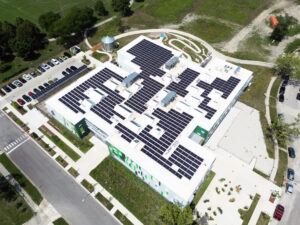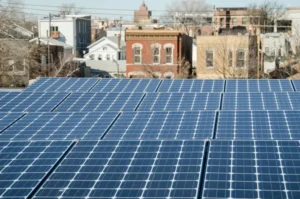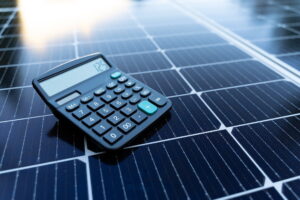The rising cost of electricity bills can feel overwhelming, especially when you receive unexpectedly high amounts on your ComEd statement. This article explains why your utility charges keep increasing and how switching to solar energy can protect you from future price hikes. We cover the factors driving ComEd bills, the benefits of installing solar panels, and practical guidance on choosing, financing, and maintaining a solar energy system so you can lower your electric bill and invest in a sustainable energy future.
What Are the Main Reasons Your ComEd Electricity Bills Are Increasing?
Your ComEd bills may be rising due to several factors including increasing energy rates, seasonal weather changes, additional fees, and evolving policies impacting the utility industry.
How Do Energy Rates and Usage Affect Your ComEd Bill?
Rising energy rates are a major factor in increased bills because fuel costs and grid maintenance expenses drive up production costs. Inefficient energy use—like using outdated appliances—also raises consumption. By adopting energy-saving practices and investing in energy-efficient technology, such as ENERGY STAR appliances and smart thermostats, you can reduce overall usage and lower your bill.
What Role Do Seasonal Changes and Weather Play in ComEd Bill Fluctuations?
Seasonal extremes affect your bill significantly. In summer, increased air conditioning use and in winter, higher heating demands raise consumption. Unpredictable weather may force extended use of heating or cooling systems, further straining the grid and driving up prices. Monitoring seasonal trends can help you adjust usage and implement strategies to curb costs.
How Do ComEd’s Fees, Taxes, and Surcharges Contribute to Higher Bills?
Beyond energy use, your bill includes regulatory fees, taxes, and surcharges meant to fund grid reliability and infrastructure improvements. Although these fees support system enhancements, they also increase your monthly cost. Understanding these additional charges can help you identify areas where alternative energy solutions might offer savings.
Are There Recent Policy or Infrastructure Changes Affecting ComEd Rates?
Policy shifts such as renewable energy mandates and grid modernization projects can temporarily increase rates as costs are passed on to consumers. Keeping informed through ComEd announcements and public utility updates is key to planning your energy budget in response to these changes.
How Can Solar Energy Help Reduce Your ComEd Electricity Costs?
Solar power provides an alternative to grid-dependent electricity, potentially reducing your bills considerably.
What Are the Cost Savings From Installing Solar Panels in the ComEd Service Area?
Installing solar panels allows you to generate your own power, cutting the electricity purchased from ComEd. The National Renewable Energy Laboratory (NREL) has noted potential savings of 30–50% through net metering, where any surplus energy gets credited back to your account. Additionally, incentives such as the federal Investment Tax Credit (ITC) help lower installation costs and improve payback periods.
How Does Generating Your Own Solar Power Lower Dependence on ComEd?
By producing energy onsite, you decrease reliance on the traditional grid. Even if energy rates rise, your solar panels continue to generate electricity from direct current (DC) converted to alternating current (AC) for home use. This self-sufficiency not only reduces consumption costs but also insulates you from future rate hikes.
Can Solar Energy Protect You From Future ComEd Rate Increases?
Solar panels offer long-term price stability because after installation, costs remain fixed with minimal maintenance. Some homeowners even use power purchase agreements (PPAs) to lock in pricing. With solar, you hedge against inflation and utility rate volatility, ensuring easier budgeting and financial security.
What Are the Environmental and Financial Benefits of Switching to Solar Panels?
Solar panels not only cut bills but also offer significant environmental and financial advantages.
How Does Solar Energy Reduce Your Carbon Footprint Compared to ComEd Electricity?
Unlike fossil-fuel power plants, solar panels produce energy without harmful emissions. By switching to solar, you reduce your carbon footprint—a critical step in fighting climate change. This sustainable choice aligns with global initiatives for energy transition and environmental responsibility.
In What Ways Can Solar Panels Increase Your Home’s Value in Illinois?
Homes with solar installations are increasingly attractive to eco-conscious buyers. Studies show that such homes often sell for 4–6% above market averages due to lower operational costs and energy independence. A solar system, especially with strong workmanship warranties and high-efficiency solar inverters, can be a top solar feature that boosts property value.
What Financing and Incentive Options Are Available for Solar Installation in the ComEd Area?
Various financing options—including cash purchases, leases, and PPAs—help make solar accessible. Incentives such as federal tax credits, state rebates, and local utility programs reduce upfront costs. Some community solar programs and innovative financing arrangements further ease the transition to renewable energy, offering bright ideas for lowering electric bills.
How Do ComEd Solar Incentives and Policies Support Solar Energy Adoption?
ComEd and state policies now actively support solar energy with rebates and net metering incentives that encourage renewable adoption by residential and commercial customers.
What Are the Key ComEd Solar Rebates and Incentives for Residential Customers?
ComEd offers rebates and performance-based incentives to offset installation costs. These programs help lower financial barriers and provide immediate savings, making solar installations more affordable for many households.
How Does Net Metering Work With ComEd to Maximize Solar Savings?
Net metering credits excess solar power that your panels generate, reducing your overall electricity charges. This system balances generation and consumption, ensuring that you benefit even when production dips, such as on cloudy days or during high-demand periods.
What Are the Steps to Get Solar Permits and Approvals in the ComEd Territory?
Obtaining permits typically involves submitting system designs, safety certifications, and proof of compliance with local codes. Working with an experienced local provider simplifies this process, ensuring all inspections and interconnection agreements with ComEd are handled efficiently and correctly.
What Should You Consider When Choosing a Solar Energy Provider in the ComEd Service Area?
Choosing the right solar provider is crucial for maximizing performance and financial benefits.
Why Is Local Expertise Important for Solar Installation Near ComEd Customers?
Local experts understand the specific challenges of the Illinois climate, including seasonal variations and local regulations. Their hands-on experience helps optimize system design and ensures quick permit approvals, which is vital for long-term efficiency.
What Questions Should You Ask About Solar System Design and Maintenance?
Ask about panel types, expected production relative to your roof’s orientation, system lifespan, and maintenance plans that include regular inspections and performance monitoring. Clear answers will ensure your solar system continues to operate efficiently for years.
How Do Financing Options Affect Your Solar Investment and Savings?
Different financing options—cash, lease, or PPA—can impact your savings. A cash purchase may yield higher long-term benefits, while leases or PPAs can reduce upfront costs. Evaluating these options in the context of your personal energy consumption and financial situation is essential.
How Can You Monitor and Maximize Your Solar Energy System’s Performance?
Efficient performance of your solar system is critical to achieving ongoing savings.
What Tools Are Available to Track Solar Energy Production and Usage?
Digital platforms and smart monitoring systems provide real-time data on energy production, consumption, and system health. These user-friendly dashboards help track performance and quickly identify any issues needing attention.
How Does Battery Storage Enhance Solar Benefits and Reduce ComEd Dependence?
Battery storage complements solar panels by capturing excess energy during periods of high solar irradiance. This stored power is useful during peak demand or low production times, further reducing reliance on ComEd and providing backup during outages.
What Maintenance Practices Keep Your Solar Panels Efficient Over Time?
Regular cleaning, scheduled inspections, and prompt repairs keep panels operating at peak efficiency. Consistent maintenance ensures that your investment continues to deliver reliable energy savings and supports long-term performance.
What Are Common Myths About Rising ComEd Bills and Solar Energy?
Misconceptions about utility bills and solar energy can hinder informed decision-making.
Is Solar Energy Too Expensive or Complicated for Most ComEd Customers?
Many assume solar is unaffordable, but advances in solar technology and attractive financing options have made it accessible. Local installers simplify the process through streamlined permit approvals and integrated system designs.
Does Solar Energy Work During Illinois’ Cloudy or Winter Months?
Some believe solar only works in bright, sunny skies, yet modern panels generate power even on overcast days. Integrated battery storage and improved panel efficiency ensure that solar systems continue to reduce your electric bill year-round.
Can Switching to Solar Really Eliminate Your ComEd Electricity Bills?
While complete off-grid living is challenging, solar can dramatically reduce your reliance on ComEd. With net metering and proper system sizing, many households experience near-zero electric bills under optimal conditions.
Table: Comparison of Traditional Utility Costs versus Solar Savings
| Energy Source | Average Cost Increase (%) | Carbon Emissions Reduction | Reliability/Long-term Savings |
| ComEd Electricity | 5–10% annually | High | Increasing due to policy changes |
| Solar Energy | Fixed, low maintenance | Up to 80% lower emissions | Consistent, with potential for net-zero bills |
This table illustrates that while traditional electricity costs continue to rise because of fuel prices and infrastructure fees, solar energy provides predictable savings and significant environmental benefits.
Frequently Asked Questions
Q: How quickly can a solar system reduce my ComEd bill?
A: Most systems show reduced bills within the first billing cycle after installation when net metering is used.
Q: What maintenance is required for solar panels?
A: Routine cleaning and periodic professional inspections are necessary to ensure efficient performance over the system’s lifespan.
Q: Are there financing options for installing solar panels?
A: Yes, common options include cash purchases, solar leases, and power purchase agreements (PPAs), each offering unique financial benefits.
Q: How does net metering work with ComEd?
A: Net metering credits excess solar energy back to your account, reducing overall electricity costs during periods of low production.
Q: Can solar energy power my entire home?
A: With proper system sizing and battery integration, solar can significantly offset your energy use, often covering most or all of your home’s needs.
Final Thoughts
Switching to solar energy can yield substantial financial and environmental benefits while reducing your dependence on rising utility rates. By understanding the factors behind increasing ComEd bills, you can make informed decisions about installing a solar system. The integration of renewable energy not only brings long-term savings and higher property value but also supports a sustainable future. If you’re ready to explore how solar panels can transform your energy costs, consider consulting with an expert to find the best tailored solution for your needs.




